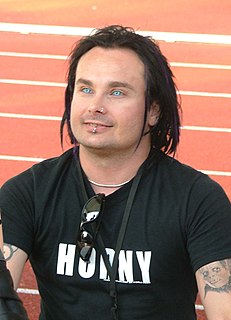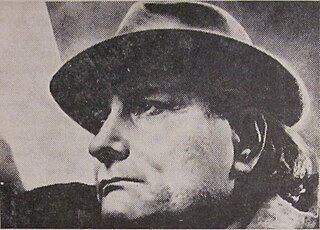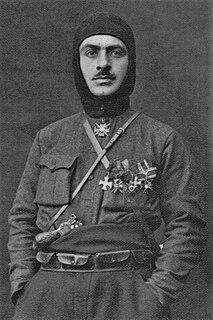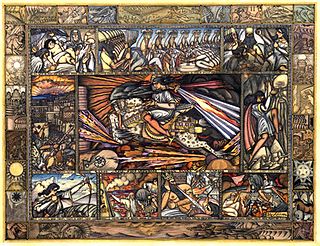Related Research Articles

A lullaby, or cradle song, is a soothing song or piece of music that is usually played for children. The purposes of lullabies vary. In some societies they are used to pass down cultural knowledge or tradition. In addition, lullabies are often used for the developing of communication skills, indication of emotional intent, maintenance of infants' undivided attention, modulation of infants' arousal, and regulation of behavior. Perhaps one of the most important uses of lullabies is as a sleep aid for infants. As a result, the music is often simple and repetitive. Lullabies can be found in many countries, and have existed since ancient times.

The Armenian Soviet Socialist Republic, also commonly referred to as Soviet Armenia or Armenia was one of the constituent republics of the Soviet Union in December 1922 located in the South Caucasus region of Eurasia. It was established in December 1920, when the Soviets took over control of the short-lived First Republic of Armenia and lasted until 1991. It is sometimes called the Second Republic of Armenia, following the First Republic of Armenia's demise.

"Wynken, Blynken, and Nod" is a popular poem for children written by American writer and poet Eugene Field and published on March 9, 1889. The original title was "Dutch Lullaby". The poem is a fantasy bed-time story about three children sailing and fishing among the stars from a boat which is a wooden shoe. The names suggest a sleepy child's blinking eyes and nodding head. The spelling of the names, and the "wooden shoe," suggest Dutch language and names, as hinted in the original title.

Soghomon Soghomonian, ordained and commonly known as Komitas, was an Armenian priest, musicologist, composer, arranger, singer, and choirmaster, who is considered the founder of the Armenian national school of music. He is recognized as one of the pioneers of ethnomusicology.

Love You Forever is a Canadian picture book written by Robert Munsch and published in 1986. It tells the story of the evolving relationship between a boy and his mother.

Etchmiadzin Cathedral is the mother church of the Armenian Apostolic Church, located in the city of Vagharshapat (Etchmiadzin), Armenia. According to most scholars it was the first cathedral built in ancient Armenia, and is often considered the oldest cathedral in the world.

Daniel Lloyd Davey, known professionally as Dani Filth, is the lyricist, vocalist, and founding member of the metal band Cradle of Filth. He has a five-octave vocal range.
"Suo Gân" is a traditional Welsh lullaby written by an anonymous composer.

Hovhannes Shiraz was an Armenian poet.

"Rock-a-bye Baby" is a nursery rhyme and lullaby. It has a Roud Folk Song Index number of 2768.

Garegin Ter-Harutyunyan better known by his nom de guerreGaregin Nzhdeh, was an Armenian statesman and military strategist. As a member of the Armenian Revolutionary Federation, he was involved in the national liberation struggle and revolutionary activities during the First Balkan War and World War I and became one of the key political and military leaders of the First Republic of Armenia (1918–1921). He is widely admired as a charismatic national hero by Armenians.

Alexander Afanasyevich Spendiarov (Spendiaryan) was a Russian and Soviet music composer, conductor, founder of Armenian national symphonic music.
"All the Pretty Little Horses" is a traditional lullaby from the United States. It has inspired dozens of recordings and adaptations, as well as the title of Cormac McCarthy's 1992 novel All the Pretty Horses. The melody is also used in the score of the film Misty of Chincoteague based on the book by Marguerite Henry.

The Starlight Express is a children's play by Violet Pearn, based on the imaginative novel A Prisoner in Fairyland by Algernon Blackwood, with songs and incidental music written by the English composer Sir Edward Elgar in 1915.

Surb Karapet Monastery was an Armenian Apostolic monastery in the historic province of Taron, about 30 km (19 mi) northwest of Mush (Muş), in present-day eastern Turkey.

Daredevils of Sassoun is an Armenian heroic epic poem in four cycles (parts), with its main hero and story better known as David of Sassoun, which is the story of one of the four parts.

Presidential elections were held in Armenia on 18 February 2013. In the run-up to the elections, Armenian's first President Levon Ter-Petrosyan and one of the richest men in the country Gagik Tsarukyan, leader of the second largest parliamentary party Prosperous Armenia, withdrew from the race in December 2012. Many believed that no candidate would be able to challenge incumbent President Serzh Sargsyan, others stated that people see "absence of alternatives" and these factors caused great apathy among the public.

Various political and civil groups staged anti-government protests in Armenia in 2013. The first series of protests were held following the 2013 presidential election and were led by the former presidential candidate Raffi Hovannisian. Hovannisian, who, according to official results, lost to incumbent Serzh Sargsyan, denounced the results claiming they were rigged. Starting on 19 February, Hovannisian and his supporters held mass rallies in Yerevan's Freedom Square and other cities. On 10 March, Hovannisian started a hunger strike, calling elected President Sargsyan to resign before 9 April, the inauguration day. Hovannisian called "for the solution of this unprecedented pan-national fundamental issue before April 9." During an interview on 18 March 2013, Sargsyan said he would not visit Hovannisian and described his claims as "arrogant phrases seasoned with obscenities". Sargsyan was inaugurated on 9 April 2013, while Hovannisian and thousands of people gathered in the streets of Yerevan to protest it, clashing with the police forces blocking the way to the Presidential Palace. Hovannisian's movement was dubbed "Barevolution", a portmanteau of barev and revolution, referring to Raffi Hovannisian's habit of walking up to people and greeting them during the election campaign.

William Weiner is an Armenian–Israeli composer, violinist and vocalist; Meritorious Worker of Art of Armenia (2008); a member of the Israel Composers League (2013); president of the Jewish cultural center "Menorah" in Armenia (1994), and director of the Yerevan State Chamber Choir (2018).
"Schlaf, Kindlein, schlaf" is a German lullaby.
References
- ↑ A. Aharonyan, “Nazei Ororĕ,” Hay Gin, year 12, no. 1 (1931): 4248.
- S.H. Hooke. 1963. Middle Eastern Mythology. Penguin Books, Baltimore.
- M. Tumajan. 2005. Armenian Songs and Sayings. Academy of Sciences, Armenia.
- Komitas. 1998. The Complete Works. Academy of Sciences, Armenia.
- M. Prudyan. 2004. Armenian Folk Music Creations. Amrots Printing, Yerevan.